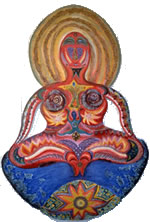
|
This section focuses on the late twentieth century interest in the women at Troy and their goddesses. In order to examine the role of women at Troy, as re-envisioned by the Women's Movement of the 1970s and 1980s, I have selected several recent novels about Troy. Each examines the roles of women and goddesses/gods in the story of Troy, but does so with a late twentieth century twist of feminism, even the one written by a man (Daughter of Troy). None is great literature, but all are interesting, especially when considering what can still be done with this very ancient story tradition.
One of the fascinating elements in these contemporary Troy novels, especially The Firebrand, Daughter of Troy, Goddess, The Autobiography of Cassandra, and To Follow the Goddess, is the use of late twentieth century feminism and its rediscovery and/or recreation of ancient times when goddesses had their own religions and women were more powerful and better treated than for the next several thousand years. Whatever the actual truth of these modern feminist interpretations, Troy has become a symbol for this late twentieth century interest in the women of Troy and the ancient goddess religions. The Mycenaean Greeks are represented as the patriarchal, god-worshipping invaders who destroyed the matriarchal, goddess-worshipping civilizations of the Eastern Mediterranean and ancient Near East, including Troy. The authors of The Firebrand, The Autobiography of Cassandra, Goddess, and To Follow the Goddess are women and clearly influenced by the women's movement. The author of Daughter of Troy is a man and not a feminist; nonetheless, he too uses the goddess theme in his novel. The author of Song of Troy, a woman, uses the old religion/new religion ideas, but does not otherwise make feminism a significant issue in her version. Sherri Tepper's provocative Gate to Women's Country, carries the myth of Iphigenia into a bitter post-nuclear war future, where women control the cities and men are almost all soldiers, living in armed camps outside the cities and manipulated by the women into killing one another in order to breed violence out of the society. Some of these books, all paperbacks, may be hard to find, so I suggest referring to the list of Online Booksellers if you can't find them locally. I have bought all of these books online, some new and some used; none were rare or expensive, so if one interests you, go ahead and search for it.
| |||
ESSAYS AND BOOKS ABOUT TROJAN WOMEN
- Cassandra: information about the myth of Cassandra, who is the main character in Zimmer-Bradley's The Firebrand.
- " The Conflicting Views of Helen": An essay by Katie Olesker.
- .About Helen of Troy: A thorough and reliable essay about Helen by Robert E. Bell
- Helen of Troy Reloaded: by Lisa Rengo George and Anne Duncan. This is an interesting long essay on the many versions of Helen from antiquity to the recent miniseries "Helen of Troy."
- Internet Women's History Sourcebook
- "Iphigenia and Other Daughters": Reviewed by Helen Foley.
- "Iphigenia and Other Daughters": A review of McLaughlin's play by Carl A. Rossi.
- The People vs. Clytemnestra: This unusual site offers arguments pro and con Clytemnestra's murder of Agamemnon. Clytemnestra became an important character in a number of feminist works of fiction in the 1980s and beyond.
ETEXTS
- Helen in Egypt : an audio recording by H. D. (Hilda Doolittle). She wrote her epic poem based on the variant myth that Helen was never at Troy, but only a false image of her (an eidolon) was there. Helen actually spent the ten years of the Trojan War on an island off of Egypt.
- "Helen of Troy does Countertop Dancing": a poem by Margaret Atwood.
- "Helen of Troy": a poem by Sara Teasdale. Helen regrets her role in the destruction of Troy and blames the gods, of course. Annoying ads, but scroll down to the poem.
- Spartan Women in the Spotlight: a thoughtful, detailed review by Thomas J. Sienkewicz, of Sarah Pomeroy's Spartan Women. Helen of Troy was from Sparta, a very different sort of place from Athens, especially for women.
- The Trojan Women by Euripides: E-text from MIT. Sherri Tepper's Gate to Women's Country includes an extremely bitter anti-war play that the women rehearse and perform every year, which is based on a mixture of The Trojan Women and other Greek plays about the Trojan War.
- What are the best poems about Helen of Troy? Quora site suggests three.
TEPPER AND ZIMMER-BRADLEY
- Authors and Books: Information about Tepper and Zimmer-Bradley, and about their books.
GODDESSES AND AMAZONS
- Goddess Religion and Amazons: A list of links to sites about these interesting topics.
